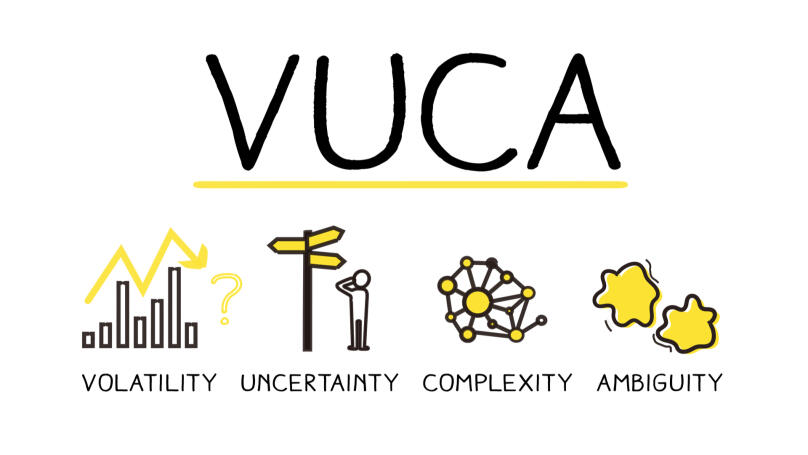What do you have to know to survive in today's world?
How would you describe the world we are living in? Personally, the first words that come to my mind are “unpredictable” and “risky.” For this reason, it is called VUCA. It is a military acronym consisting of the English words volatility, uncertainty, complexity and ambiguity.

We met the experts from the International Academy of Management and discussed the peculiarities of the VUCA in detail. So how could we fit in and succeed in such a world?
Living in the VUCA world means constant learning and re-learning

The manifestations of the VUCA-world in practice can be noticed with the naked eye. Just look around! Here's how our usual day looks like:
- work - you have to deal with loads of local and global tasks, prioritize, delegate, and sometimes even have to go beyond your competencies;
- family - you have to combine the family life and the household chores with your work and hobbies;
- friends - everyone is in a hurry to share their news and concerns;
- social media - we have to deal with a continuous flow of incoming information and never stop analysing the news;
- news reports - every day something happens in the world, and most of it is negative.
The VUCA world is an era where we have no confidence in tomorrow and no clear benchmarks. Take the coronavirus pandemic: who knew it would strike so suddenly? And there will be many more such shocks. We can say that now we are living outside the comfort zone, and we have to accept that because the zone of comfort we used to be is highly unlikely to return to. And that's good! After all, true personal growth only begins when life challenges us. This is why the trend on life learning is so relevant now. It doesn't matter what kind of higher education you have. If you stopped studying after you graduated, we have bad news for you.
Who adapts best to live in the VUCA world

The main thing in the VUCA world for both professionals and businesses is to be able to adapt in time. This requires constant and attentive listening to trends and using the latest tools not only to develop the company but also to develop yourself. It brings up the question: what kind of people actually find it easiest to fit in and build a career in the VUCA world?
To do this, you need to:
- have flexible and unconventional thinking;
- be able to analyse things quickly;
- be creative;
- have well-developed communication skills;
- be emotionally intelligent;
- be inquisitive.
In terms of psychology, people with a "plastic psyche" are the easiest to fit in and most successful in the VUCA. Such people can find a way out of any difficult situation and adequately assess their strengths and weaknesses. They are not prone to panic and have a keen sense of how to make profitable decisions. Most often such personalities grow up in democratic or unstable societies because to get into VUCA, you need freedom of thought and the ability to adapt.
5 tips for the VUCA residents

To be honest, it's not easy to build into such an unpredictable world. I have developed my own rules to succeed in the VUCA world and would like to share them with you:
TIP #1 Give up multitasking
It might seem as if I should be advising multitasking, because how else could we complete this enormous number of tasks we have to deal with every day? The answer is simple. There's nothing better than prioritization and delegation. Today, you need to be able to focus. Don't try to be like Julius Caesar! Plan your actions and complete your tasks step by step. Avoid trying to do everything at once because it will hurt your productivity and throw you back without you even noticing it.
TIP #2 Learn and unlearn
Education is as indispensable for a successful person as a Rolex watch. Today's labour market is volatile. It is no longer enough to stay in the same niche throughout life. Moving from one field to another and changing work every 5 years has become the norm. The working age has increased, and the educational age has increased as well. You need to be able to change your habits and even your outlook.
TIP #3 Level up your flexibility and 4C skills
I love classical literature, and I really love Gone With the Wind by Margaret Mitchell. So Mitchell once wrote: "When strong winds blow, we become very flexible because we know that this flexibility will pay off." Being flexible is a whole strategy. This is why the Agile methodology is so popular. 4C skills are creativity, communication, collaboration, and critical thinking. Today, these soft skills are even more important than your hard skills.
TIP #4 Manage your energy, not your time
Tony Schwartz in his book The Power of Full Engagement identifies four types of energy: physical (sleep, sport, food), emotional (communication and empathy), mental (concentration and mindfulness), spiritual (values and goals). Everything should be in harmony. Don't neglect sport for communication or communication for sport. Schedule how to fill all these four types of energy, because they may dwindle like any other resource.
TIP #5 Eat an elephant one bite at a time
When you order a steak in a restaurant, you never try to cram the whole thing in your mouth, right? It's the same with the tasks. Break up a big one into smaller parts. It's a skill that will save a lot of your energy, allow you to get more things done and stay productive for a long time. In the VUCA world, it's important to keep yourself motivated. Otherwise, you won't survive the race.
As dangerous and unpredictable as the VUCA world is, it contains a whole sea of opportunities that would simply not be found in a stable world. Personally, I'm glad to live in such a great and bright time, are you? Adapt, relearn, be open to new things, and you will never miss any of these opportunities!
Share this with your friends via:
Latest News

A significant stage in the development of the alternative education system has begun in West Northamptonshire in the UK: the County Council is actively calling on parents, guardians, and trustees to participate in shaping the future of this key area.

Outwoods Primary School in Atherstone, Warwickshire, having experienced deep sadness after the loss of their famous cat, Silla, has found solace in a new pet – a Maine Coon named Aloysius O’Hara.

In modern universities, artificial intelligence, and in particular ChatGPT, is rapidly transforming from a controversial tool into a full-fledged student assistant.

An innovative educational project is gaining momentum in UK primary schools, aiming to change attitudes towards video games.

The Massachusetts Institute of Technology (MIT) presents MIT Learn – a revolutionary online platform that opens a “new front door” to access university knowledge and resources.












 “I’m Here for the Long Haul”: When Loyalty to a Company Becomes Toxic
“I’m Here for the Long Haul”: When Loyalty to a Company Becomes Toxic
 Freelancing, Remote Work, Office Jobs, or Consulting: How to Choose the Work Format That’s Right for You
Freelancing, Remote Work, Office Jobs, or Consulting: How to Choose the Work Format That’s Right for You
 Test: How Prone Are You to Abusive Behavior as a Manager?
Test: How Prone Are You to Abusive Behavior as a Manager?
 Test. What superpower would you possess if you were a superhero?
Test. What superpower would you possess if you were a superhero?
 Test. What Should You Let Go of Before Winter Ends?
Test. What Should You Let Go of Before Winter Ends?
 Test. Which Ritual Should You Start Practicing This Winter?
Test. Which Ritual Should You Start Practicing This Winter?
